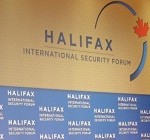Halifax, a beautiful town on the Atlantic coast of Nova Scotia, and also home to the Canadian Navy’s East Coast Fleet, is hosting government leaders, statesmen, international security analysts and media professionals from around the world for the prestigious annual Halifax International Security Forum. The event began in 2009, and is now in its fifth year.
Upon my arrival in the city, the weather is chilly and overcast. It is an appropriate atmosphere to discuss a relevant theme: in what ways can the ‘liberal’ West and particularly the United States maintain their primacy in international relations amidst the growing clouds of uncertainty fuelled by the crisis in Syria and West Asia, the drawdown from Afghanistan and the perceived retreat of the U.S., the revelations of Edward Snowden and the resulting loss of face among the allies, the rise of China and the pivot to Asia.
Most appropriately, the conference begins on November 22, with a 1963 speech by late American President John F. Kennedy (whose 50th death anniversary is incidentally on the same day) declaring that the U.S. and the West would take a lead to spread peace globally. The message reverberates through the audience and sets the expectation for U.S. Defence Secretary Chuck Hagel to begin discussions on similar lines.
Secretary Hagel inaugurates the conference with the right tone: he outlines the complexity of current international politics and the U.S. commitment to firmly deal with the challenges. He then mentions the deep strategic relationship between the U.S. and Canada. And then he delivers the googly. Instead of talking about the ways in which U.S. can resurrect its leadership, he proceeds forward to discuss the Arctic – the polar region which has recently seen a great power game with ice melting, opening the potential for mineral and oil resources exploitation, and announces the launching of the Department of Defence’s Arctic strategy at the forum.
The audience is taken aback by Hagel’s stance, but they nonetheless applaud his speech. Deep down, however, there is an anxiety among many from the U.S., Canada and NATO: Are U.S. concerns about the Arctic so great that the Secretary of Defence needn’t even mention the existing challenges to the U.S. and the West’s leadership in the world?
The next two days of the conference are however expected to compensate for this disappointment, with imaginatively titled sessions such as “The West Today: Calculated Power or Complete Paralysis?,” “Bloody Autocracy, Religious Kleptocracy, Unstable Democracy,” and “Dangerous Liaisons: Relying on Corrupt Allies.”
On another note, despite the intimate relationship between the U.S. and Canada, the people from Halifax and other parts of Canada fiercely maintain their distinct identity from the United States. And for any visitors with doubts regarding this matter, there is a signboard just a stone’s throw away from the conference, debating U.S. hegemony. It proudly declared, “Why aren’t we Americans?” denoting the War of 1812 when the U.S. tried to annex the British North American territory (part of modern-day Canada), which was bravely revolted by residents of Halifax and other areas. During the conference proceedings, one American gentleman dismissed the 1812 war as a ‘freak incident,’ but the Canadians politely told him that it is no laughing matter.
Sameer Patil is Fellow, National Security Studies and Director, Centre for International Security at Gateway House.
This blog was exclusively written for Gateway House: Indian Council on Global Relations. You can read more exclusive content here.
For interview requests with the author, or for permission to republish, please contact outreach@gatewayhouse.
© Copyright 2013 Gateway House: Indian Council on Global Relations. All rights reserved. Any unauthorized copying or reproduction is strictly prohibited


